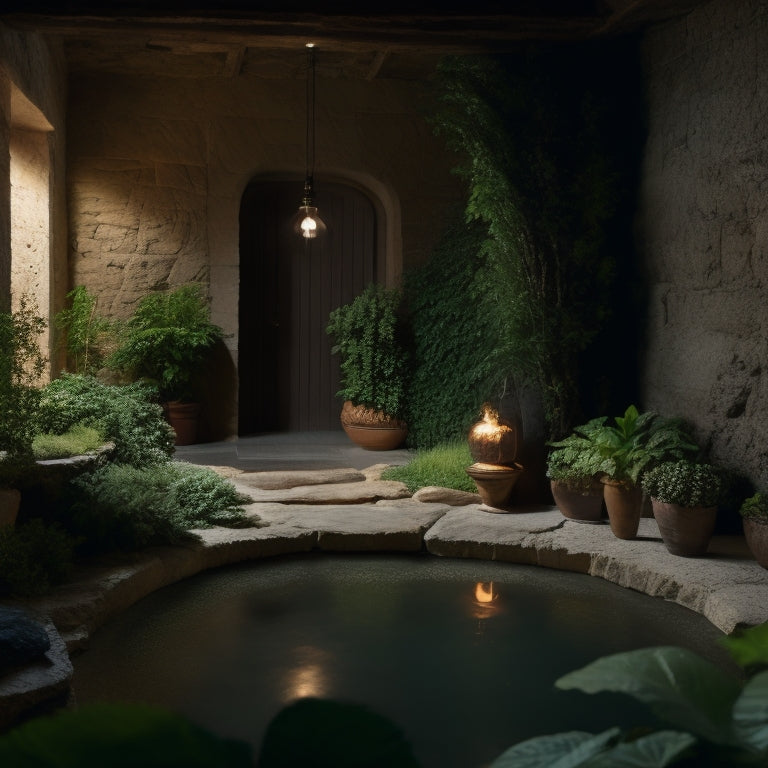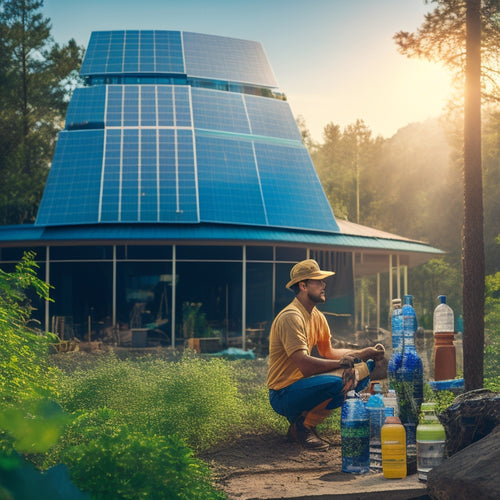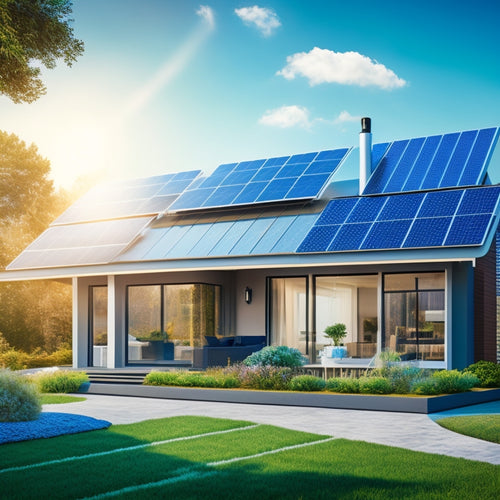
Sustainable Basement Waterproofing: Earth-Friendly Solutions Revealed
Share
You're making the switch to sustainable basement waterproofing solutions, and you're on the right track. Eco-friendly materials like biodegradable membranes and recycled materials reduce waste and conserve natural resources. Rainwater harvesting systems alleviate pressure on sewer systems and reduce water bills. Permeable concrete solutions and natural drainage techniques manage stormwater runoff, while green insulation options and energy-efficient pumps minimize environmental impact. As you investigate these earth-friendly solutions, you'll uncover even more innovative ways to protect your basement while protecting the planet, and that's just the beginning of your sustainable waterproofing expedition.
Key Takeaways
- Biodegradable and recycled materials provide eco-friendly alternatives to traditional waterproofing methods, reducing waste and conserving natural resources.
- Rainwater harvesting systems minimize stormwater runoff, alleviate pressure on sewer systems, and reduce water bills for outdoor purposes.
- Permeable concrete solutions allow rainwater to percolate, reducing stormwater runoff and alleviating hydrostatic pressure around basements.
- Natural drainage techniques, such as soil grading and groundwater flow management, direct water away from foundations, preventing structural damage.
- Energy-efficient pumps and green insulation options reduce energy consumption, lower carbon footprint, and promote sustainable basement waterproofing practices.
Eco-Friendly Waterproofing Materials
Many homeowners are now opting for eco-friendly waterproofing materials as a sustainable solution to their basement waterproofing needs.
You're likely considering this approach too, and rightly so. Traditional waterproofing methods can harm the environment, but eco-friendly alternatives offer a guilt-free solution.
Biodegradable membranes, for instance, are made from natural resources that can easily decompose, reducing waste and the carbon footprint of your project.
Additionally, incorporating Renewable Energy Sources into your waterproofing system can further minimize its environmental impact.
You can also opt for waterproofing materials made from recycled materials, which conserve natural resources and decrease landfill waste.
Rainwater Harvesting Systems
You're likely familiar with the importance of reducing stormwater runoff, which can overwhelm sewer systems and contribute to water pollution.
By installing a rainwater harvesting system, you can collect and store rainwater efficiently, reducing the amount of stormwater that flows into nearby waterways.
Furthermore, integrating solar-powered systems, such as fast charging infrastructure, can further minimize the carbon footprint of your basement waterproofing solution.
This approach not only helps the environment but also allows you to repurpose collected rainwater for non-potable uses, such as flushing toilets or irrigating your garden.
Collecting Rainwater Efficiently
Reduce your water bill by collecting and reusing rainwater for outdoor purposes.
Implementing renewable energy sources, such as solar energy solutions, can also contribute to a more sustainable approach. By capturing solar power, you can decrease your reliance on fossil fuels and lower your carbon footprint.
Implement rain barrel systems to store rainwater for non-potable uses. Design rooftop gardens that make use of harvested rainwater for irrigation.
Conserve potable water by using harvested rainwater for washing cars and outdoor cleaning.
Reducing Stormwater Runoff
By integrating rainwater harvesting systems into your basement waterproofing strategy, you can greatly reduce stormwater runoff and mitigate its environmental impacts.
Stormwater management is essential in urban areas where impervious surfaces like pavement and buildings exacerbate urban runoff. By collecting and storing rainwater, you can reduce the amount of stormwater that flows into nearby waterways, carrying pollutants and causing erosion.
Effective stormwater management also helps to recharge groundwater aquifers, maintaining healthy water tables and preventing basement water seepage.
Additionally, incorporating renewable energy solutions, such as green hydrogen fuel cells, can further enhance the sustainability of your rainwater harvesting system.
Permeable Concrete Solutions
Permeable concrete solutions have emerged as a breakthrough in sustainable basement waterproofing, offering a unique approach to managing water infiltration. By allowing rainwater to percolate through the surface, these innovative materials reduce stormwater runoff and alleviate pressure on your basement.
With the increasing adoption of electric fleets, companies like Anheuser-Busch are also exploring sustainable solutions for their logistics and delivery operations.
You can reap the benefits of permeable concrete solutions in various applications, including:
- Permeable pavers for driveways and walkways, which enable water to drain through the surface
- Porous asphalt for parking lots, which reduces stormwater runoff and filters out pollutants
- Permeable concrete blocks for retaining walls, which allow water to seep through and reduce hydrostatic pressure
- Pervious concrete for sidewalks and patios, which enables water to infiltrate the soil and recharge groundwater aquifers
Natural Drainage Techniques
You'll want to implement natural drainage techniques to prevent water accumulation around your basement.
This involves managing groundwater flow by creating a gradient that directs water away from the foundation, and using soil grading techniques to guarantee the surrounding soil slopes at an ideal angle.
Groundwater Flow Management
Groundwater flow management is an essential aspect of sustainable basement waterproofing, as it directly affects the hydrostatic pressure surrounding your foundation.
Effective management prevents water accumulation, reducing the risk of water seepage and structural damage.
- Implement subsurface drainage systems to direct groundwater away from your foundation
- Use permeable materials to allow rainwater to infiltrate the soil, reducing runoff and recharging the aquifer
- Install rain barrels or cisterns to harvest and employ rainwater for non-potable purposes
- Employ vegetative cover to increase evapotranspiration, reducing stormwater runoff and alleviating pressure on your foundation
Soil Grading Techniques
Soil grading techniques, also referred to as natural drainage techniques, play an important role in sustainable basement waterproofing by optimizing the slope and elevation of the surrounding soil to direct water away from your foundation.
By adjusting the soil's grade, you'll create a natural flow of water that reduces the risk of seepage and flooding. This approach also helps prevent soil compaction, which can impede water flow and exacerbate drainage issues.
A vital aspect of soil grading is the installation of a drainage layer, such as gravel or crushed stone, to facilitate water flow and reduce hydrostatic pressure on your foundation.
Green Insulation Options
As homeowners invest in sustainable basement waterproofing, they're finding that green insulation options offer an essential layer of protection against moisture and energy loss.
You can choose from a variety of eco-friendly materials that not only reduce your carbon footprint but also provide effective insulation.
-
Recycled insulation made from post-consumer materials reduces waste and conserves natural resources.
-
Cellulose fiber insulation is a popular choice, as it's made from recycled paper products and offers excellent thermal performance.
-
Spray foam insulation made from soy or castor oil is a sustainable alternative to traditional foam.
- Radiant barrier insulation helps reflect heat rather than absorb it, reducing energy loss and promoting a more energy-efficient home.
Energy-Efficient Pumps
With a well-insulated basement in place, it's time to contemplate the heart of your waterproofing system: the pumps that remove water that's entered your basement. You'll want to choose pumps that prioritize energy conservation, reducing your carbon footprint and saving you money on utility bills. Consider pumps with high-efficiency motors and adjustable speed controls to optimize energy usage.
| Pump Feature | Energy Efficiency Benefit |
|---|---|
| High-Efficiency Motor | Reduces energy consumption by up to 30% |
| Adjustable Speed Control | Optimizes energy usage based on water flow |
| Automatic Shut-Off | Prevents unnecessary energy waste when not in use |
| Energy Star Certification | Meets EPA standards for energy efficiency |
| Regular Maintenance Alerts | Guarantees pump maintenance is performed on schedule, reducing energy waste |
Sustainable Waterproof Coatings
Selecting the right waterproof coating for your basement is essential to preventing water infiltration and guaranteeing a dry, healthy space.
You want to choose a coating that not only protects your basement from water damage but also aligns with your eco-friendly values.
-
Look for coatings with biodegradable sealants that break down naturally, reducing harm to the environment.
-
Opt for coatings with eco-friendly additives that minimize VOCs (volatile organic compounds) and promote indoor air quality.
-
Consider coatings made from natural, renewable resources like plant-based polymers or recycled materials.
- Check for certifications like Greenguard Gold or asthma and allergy friendly, which verify the coating meets rigorous environmental and health standards.
Environmental Impact Reduction
Because a significant portion of a building's environmental footprint stems from water damage and the subsequent need for repairs, reducing the ecological impact of your basement waterproofing solution is essential. You can achieve this by adopting sustainable practices that prioritize ecological benefits.
| Sustainable Practice | Ecological Benefit | Description |
|---|---|---|
| Using eco-friendly materials | Reduced carbon footprint | Choose materials with low VOCs and recyclable content |
| Implementing rainwater harvesting | Reduced water consumption | Collect and reuse rainwater for non-potable purposes |
| Installing energy-efficient pumps | Reduced energy consumption | Opt for pumps with high efficiency ratings |
| Implementing green roofs | Increased biodiversity | Create habitats for local wildlife and reduce urban heat island effect |
| Conducting regular maintenance | Extended system lifespan | Identify and address issues before they escalate into major repairs |
Frequently Asked Questions
Can I DIY Basement Waterproofing or Do I Need a Professional?
You're wondering if you can DIY basement waterproofing or need a pro. While DIY techniques can fix minor issues, a professional assessment is essential for identifying underlying problems and ensuring a long-term, effective solution that saves you time and money in the long run.
How Long Does a Waterproofing Project Typically Take to Complete?
You're likely wondering if a waterproofing project will take an eternity, but fear not! Typically, it'll take around 1-3 weeks, depending on the project's complexity and waterproofing techniques used, allowing you to breathe a sigh of relief and enjoy your dry, safe space.
Are Sustainable Waterproofing Methods More Expensive Than Traditional Ones?
You're probably wondering if sustainable waterproofing methods break the bank. Comparing costs, you'll find eco-friendly materials might be pricier upfront, but they often provide long-term savings, making them a worthwhile investment for your wallet and the planet.
Can I Still Use My Basement During the Waterproofing Process?
You can partially use your basement during waterproofing, but guarantee temporary usage doesn't compromise basement safety; seal off work areas, maintain ventilation, and avoid electrical hazards to minimize risks and guarantee a successful, worry-free process.
Are There Any Warranties or Guarantees for Sustainable Waterproofing Solutions?
Like Odysseus seeking safe harbor, you're wise to demand warranties for your eco-friendly waterproofing solutions, ensuring longevity expectations are met. Reputable contractors offer guarantees, providing peace of mind and protection for your investment in sustainable, eco-friendly materials.
Related Posts
-

What Tax Deductions Apply to Sustainable Building Materials?
You can claim various tax deductions for sustainable building materials, thanks to over 40 federal tax incentives sup...
-

7 Best Cool Roof Rebates for Energy-Savvy Homeowners
You're an energy-savvy homeowner looking to install a cool roof, and you're wondering which rebates can help you save...
-

7 Smart Air Purification Hacks for Energy-Savvy Homes
You can notably improve your indoor air quality while minimizing energy consumption by implementing strategic air pur...


